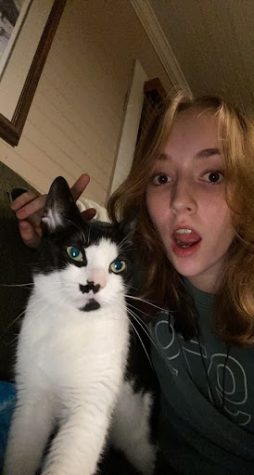Pets help owners focus on the ‘paw’sitive

Photo courtesy of Emery Grice
Junior Emery Grice’s dog Romeo is a German Shepherd-Husky mix. Romeo was adopted after the family lost their previous dog and is a great comfort to the family.
September 27, 2021
According to the American Pet Products Association, 67 percent of households in the United States have at least one pet, and for a very good reason. Scientific evidence supports the fact that pets provide their owners with an array of both mental and physical health benefits. Household pets can range from common dogs and cats to rare reptiles and fish, and entirely depends on the individual’s preference.
During the mandatory quarantine period due to COVID-19, many students around the globe found themselves with a lot of free time and deteriorating mental health. A general sense of hopelessness and despair was floating around as COVID cases and deaths grew. Unsurprisingly, many students found themselves developing new hobbies or adopting new pets.
“I got a cat named Tigger from the Stokes County Animal Shelter,” said senior Gavin Steading. “Having him made the day go by a little less lonely. He helped me get through the long days of online school.”
Other than the more obvious benefits to having a pet, such as companionship and life-long memories, pets provide many physical benefits. Interacting with animals can lower blood pressure, lower cholesterol levels, decrease triglyceride levels and release hormones such as phenylethylamine which has the same effect as eating chocolate, according to UCLA Health website. Petting dogs and cats also releases serotonin, oxytocin and prolactin which are all mood elevating hormones.
Junior Kate Vogler recently adopted a cat she named Nat from the Forsyth County Humane Society. Even though the cat has only been with her family for a short time, she is already more of a beloved family member than a pet.

“She has been a great stress reliever, and she is a lap cat, so she is a great source of love and affection,” Vogler said. “She is like an emotional support animal. Very therapeutic.”
Near-constant unconditional love and emotional support are not the only mental health benefits seen from owning pets. Simply taking the time to interact with any pet can lower anxiety, reduce loneliness, teach responsibility and ease mental illnesses such as depression.
“I rescued Milo from a grocery store,” said homeschooler Emmalee Bartle about her newest rescue kitten. “I feel less stressed around him and I am not as lonely. He’s made my life better by keeping me company and comforting me.”
Now more than ever, that emotional support and company is greatly appreciated. Students around the globe were stuck at home, and the isolation and repetitiveness oftentimes grew unbearable.
In response to the external turmoil in their lives, junior Emery Grice and her family find comfort and company in their newly acquired German Shepherd-Husky mix, Romeo. Romeo helps the family cope with the tumult of their daily lives as well as the loss of their old dog.
“Romeo provided comfort and happiness to us during quarantine,” Grice said.
Steading also adopted Tigger after the passing of another pet. The most useful benefit that Steading has observed from owning Tigger is that the cat provides him with company and breaks from constant school work and stress.
“As an only child, I was the only occupant of the house for most of the day so it was nice to have some sort of interaction,” Steading said. “What I mean by that is I would take small breaks just to feed or play with him. It was a nice distraction.”
To experience these benefits, one does not even have to own a pet. Becoming a dog walker as well as a pet sitter for a friend or neighbor can grant access to the love from pets without the usual accompanying care and bills. Also, volunteering at a local animal shelter is a great way to maximize exposure to animals as well as giving back to the community.
However, Lisa Burchett, the Reagan media center assistant, doesn’t need to find other ways to interact with animals. She has a long haired cat named Sassy.
“Her presence brings me comfort,” Burchett said. “She’s a good distraction from the demands of life.”
Although assuming charge of and cultivating a relationship with a new pet is a selfless act, the pet contributes more than their share with their ability to provide mental and physical benefits, as well as improve anyone’s day with just a wag of a tail, a hungry meow, a hiss, neigh or squeak.
“I rescued Milo because I wanted to show him he was cared for,” Bartle said. “He has made me very happy.”

